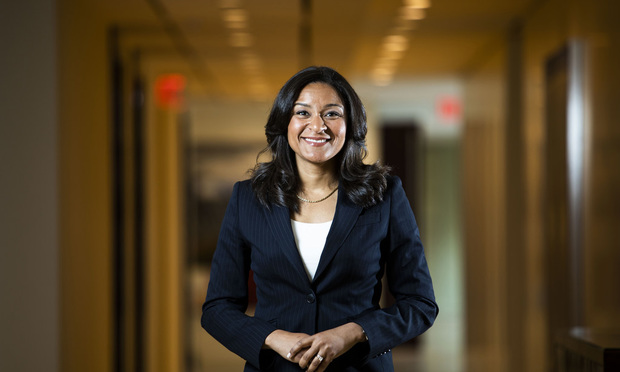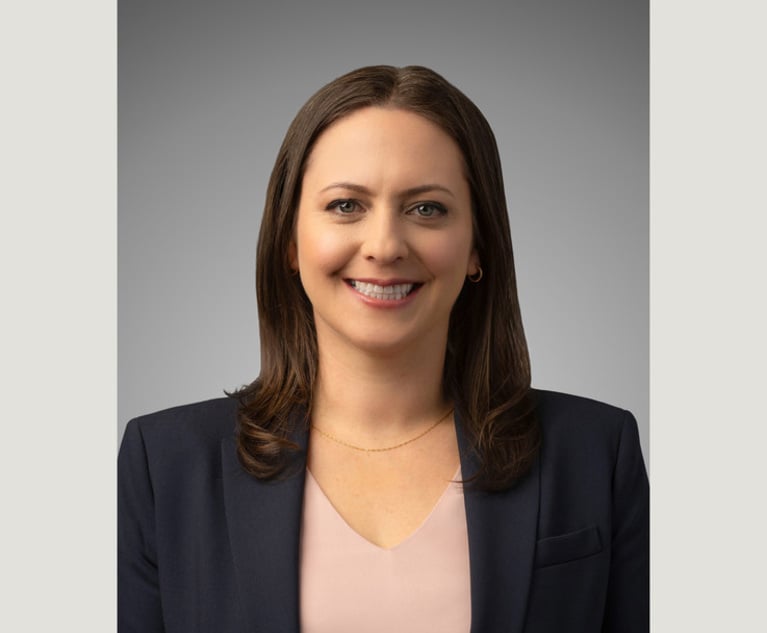Gibson, Dunn & Crutcher
The unprecedented nature of the charges against our client … really threatened fundamental principles of democracy.
April 30, 2019 at 11:59 PM
3 minute read
 Chantale Fiebig, with Gibson Dunn & Crutcher in Washington, D.C. April 12, 2019.
Chantale Fiebig, with Gibson Dunn & Crutcher in Washington, D.C. April 12, 2019.
Describe your firm's philosophy on pro bono service.
At Gibson, Dunn & Crutcher, we believe that our lawyers have a duty to contribute to society through pro bono work, including in the courts and through leadership in institutions that promote the rule of law and human rights. We strongly encourage pro bono work by all of our attorneys. Last year, we devoted over 145,000 pro bono hours worldwide to causes like immigration advocacy, protecting civil liberties and nonprofit corporate governance.
Of the big cases your firm recently worked on, you represented Aaron Cantu, a young journalist who was arrested while covering the demonstrations at the 2017 Presidential Inauguration. Tell us more about the case and how you reached the outcome.
Our client was a freelance journalist who had a long history of providing front-line coverage of significant historical events, including demonstrations and protests of important political and social issues. Despite his attendance at the demonstration in his capacity as a reporter, he was arrested and charged with felony riot. We viewed his arrest and prosecution as a double affront to the First Amendment because it not only threatened journalism, but specifically journalism covering political dissent that is itself protected by the First Amendment. We moved to dismiss the charges against him on First Amendment grounds and while our motion was pending, the government voluntarily dismissed all charges against him. It was a victory for him and freedom of the press.
What was the most satisfying aspect of that key case?
The unprecedented nature of the charges against our client—which were also filed against hundreds of others who protested the Inauguration—really threatened fundamental principles of democracy. It was incredibly empowering to see that risk and to be able to step into the ring on the right side of history. It was gratifying to contribute to a legal battle that truly touched on who we are as Americans.
Discuss other key pro bono matters recently completed by the firm.
Our pro bono matters are incredibly diverse, and reflect Gibson Dunn's commitment to principles of justice. In 2018, we continued to fight on behalf of immigrants across the United States. For example, our lawyers were able to obtain a nationwide preliminary injunction that stopped interference with DACA (Deferred Action for Childhood Arrivals), and responded immediately to help reunite immigrant families who were separated at the U.S.-Mexico border or affected by the travel ban.
We have also helped achieve justice for domestic violence survivors, regularly helping clients obtain protection orders against abusers, and we led the successful efforts in England and Wales to criminalize upskirting, the intolerable practice of taking photographs up women's skirts without their consent.
Why does your pro bono work matter to you as a lawyer?
I believe it is important to lead by example, including through pro bono work. By volunteering on these matters—which include some of the leading social and legal issues of our day—we help raise the bar, and hopefully increase the number of talented attorneys throughout the industry who become engaged on civic, social and political issues that affect all of us. I'm proud to contribute to that public service.
Responses submitted by Chantale Fiebig, a partner at Gibson, Dunn & Crutcher whose practice focuses on complex civil litigation.
This content has been archived. It is available through our partners, LexisNexis® and Bloomberg Law.
To view this content, please continue to their sites.
Not a Lexis Subscriber?
Subscribe Now
Not a Bloomberg Law Subscriber?
Subscribe Now
NOT FOR REPRINT
© 2025 ALM Global, LLC, All Rights Reserved. Request academic re-use from www.copyright.com. All other uses, submit a request to [email protected]. For more information visit Asset & Logo Licensing.
You Might Like
View All
Weil Lures DOJ Antitrust Lawyer, As Government Lateral Moves Pick Up Before Inauguration Day
4 minute read
Lawyers Share Concerns, Predictions Over How Bondi’s Loyalism to Trump May Impact DOJ
6 minute read
Kirkland, Cleary, King & Spalding Among the Latest to Add DC Laterals
3 minute read
LA-Area Law Firms Offer Support as Region Reckons With Raging Wildfires
Trending Stories
- 1Former Phila. Solicitor Sozi Tulante Rejoins Dechert
- 2'I've Seen Terrible Things': Lawyer Predicts Spike in Hazing Suits
- 3SEC Ordered to Explain ‘How and When the Federal Securities Laws Apply to Digital Assets’
- 4NY Trial Court Halts State Dragnet on Licensed Hemp Operators
- 5Report: US Attorney E. Martin Estrada to Resign From California's Central District
Who Got The Work
Michael G. Bongiorno, Andrew Scott Dulberg and Elizabeth E. Driscoll from Wilmer Cutler Pickering Hale and Dorr have stepped in to represent Symbotic Inc., an A.I.-enabled technology platform that focuses on increasing supply chain efficiency, and other defendants in a pending shareholder derivative lawsuit. The case, filed Oct. 2 in Massachusetts District Court by the Brown Law Firm on behalf of Stephen Austen, accuses certain officers and directors of misleading investors in regard to Symbotic's potential for margin growth by failing to disclose that the company was not equipped to timely deploy its systems or manage expenses through project delays. The case, assigned to U.S. District Judge Nathaniel M. Gorton, is 1:24-cv-12522, Austen v. Cohen et al.
Who Got The Work
Edmund Polubinski and Marie Killmond of Davis Polk & Wardwell have entered appearances for data platform software development company MongoDB and other defendants in a pending shareholder derivative lawsuit. The action, filed Oct. 7 in New York Southern District Court by the Brown Law Firm, accuses the company's directors and/or officers of falsely expressing confidence in the company’s restructuring of its sales incentive plan and downplaying the severity of decreases in its upfront commitments. The case is 1:24-cv-07594, Roy v. Ittycheria et al.
Who Got The Work
Amy O. Bruchs and Kurt F. Ellison of Michael Best & Friedrich have entered appearances for Epic Systems Corp. in a pending employment discrimination lawsuit. The suit was filed Sept. 7 in Wisconsin Western District Court by Levine Eisberner LLC and Siri & Glimstad on behalf of a project manager who claims that he was wrongfully terminated after applying for a religious exemption to the defendant's COVID-19 vaccine mandate. The case, assigned to U.S. Magistrate Judge Anita Marie Boor, is 3:24-cv-00630, Secker, Nathan v. Epic Systems Corporation.
Who Got The Work
David X. Sullivan, Thomas J. Finn and Gregory A. Hall from McCarter & English have entered appearances for Sunrun Installation Services in a pending civil rights lawsuit. The complaint was filed Sept. 4 in Connecticut District Court by attorney Robert M. Berke on behalf of former employee George Edward Steins, who was arrested and charged with employing an unregistered home improvement salesperson. The complaint alleges that had Sunrun informed the Connecticut Department of Consumer Protection that the plaintiff's employment had ended in 2017 and that he no longer held Sunrun's home improvement contractor license, he would not have been hit with charges, which were dismissed in May 2024. The case, assigned to U.S. District Judge Jeffrey A. Meyer, is 3:24-cv-01423, Steins v. Sunrun, Inc. et al.
Who Got The Work
Greenberg Traurig shareholder Joshua L. Raskin has entered an appearance for boohoo.com UK Ltd. in a pending patent infringement lawsuit. The suit, filed Sept. 3 in Texas Eastern District Court by Rozier Hardt McDonough on behalf of Alto Dynamics, asserts five patents related to an online shopping platform. The case, assigned to U.S. District Judge Rodney Gilstrap, is 2:24-cv-00719, Alto Dynamics, LLC v. boohoo.com UK Limited.
Featured Firms
Law Offices of Gary Martin Hays & Associates, P.C.
(470) 294-1674
Law Offices of Mark E. Salomone
(857) 444-6468
Smith & Hassler
(713) 739-1250










